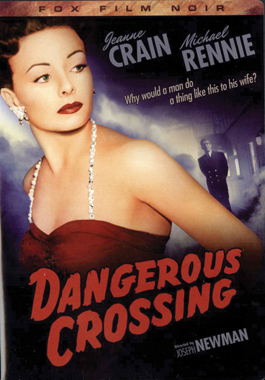home | metro santa cruz index | movies | current reviews | film review

DVD Reviews
A Japanese silent classic is re-released, the works of Gaudi are examined and film noir takes to the high seas.
The Dragon Painter; one disc; Milestone; $29.95
Muses: can't live with 'em, can't live without them. In a near hour-long drama from 1919, producer/actor Sessue Hayakawa outlines a different road the American cinema might have taken: one in which the Japanese weren't invariably cast as sinister killers or beaming houseboys. This fable, one of 22 films Hayakawa's Haworth Company made in the silent era, is a story of the war between the classical and the romantic. The hermit painter Tatsu (Hayakawa) lives by a waterfall in the Hanake Mountains of Japan (played winningly by the Yosemite valley). Meanwhile, in the city, an old master painter, the last of his line, fears he will never have an heir. He does have a beautiful daughter, played by Tsuru Aoki, Hayakawa's real-life wife. When the barefoot, ragged Tatsu becomes the master's apprentice and marries the daughter, he also loses the yearning he needed in order to paint. Hayakawa shows himself a model for the matinee idols to come in the following years; he's both as arrogant as a samurai in a woodblock and as sensitive as a '50s method actor. This Milestone edition comes with a serious array of extras, including PDF files of the original novel The Dragon Painter is based on and a clip of Hayakawa clowning with Fatty Arbuckle. Also on the disk is most of a 1914 Thomas Ince production The Wrath of the Gods (a.k.a. The Destruction of Sakura-Jima), which is longer than the main feature. The production values are phenomenal for 1914 film, with extras, costumes, sets, miniatures and special effects. It's a true epic, and yet it bears the same relationship to Asian religion as The Birth of a Nation bears to racial politics. A gray-bearded Baron (Hayakawa) and his daughter (Aoki) live like beachcombers, thanks to a curse by their strange vengeful god Buddha. A shipwrecked Yankee sailor (Frank Borzage) uses a rosary to bring the father and daughter out of superstitious darkness, but the locals will have none of it. Eventually, the one true God settles the matter with a volcano. One can discern in Borzage's acting some of the sensitivities he would show as a director; he seems a subtle, well-developed player--and contrasting these two performances also shows how much Hayakawa learned as an actor in five years. Extras here include blueprints to make your own special-effects volcano, useful if you have heathens in your neighborhood.
--Richard von Busack
Antonio Gaudi; two discs; Criterion; $39.95
No one built like the Spanish architect Antonio Gaudi. Sinuous, organic, decorated on every surface, his buildings pretty much defy the whole history of modern architecture. Japanese experimental filmmaker Hiroshi Teshigahara (Woman in the Dunes) was particularly drawn to Gaudi's natural, flowing forms; the style resonated with the sculptures of Teshigahara's father, Sofu, who worked in massive abstract forms of wood and stone. Teshigahara's 72-minute documentary about Gaudi, made in 1984, starts with some general views of Barcelona but quickly focuses on Gaudi's famous structures, from the tile-encrusted Casa Vicens to the astonishing Parc GŁell, with its serpentine bench overlooking the city, to the never-to-be completed Sagrada Familia. Some historical photos and one interview are intercut with many wordless rhapsodic tracking shots of the buildings to show their eccentric details of wrought iron and stained glass. Without some prior knowledge of Gaudi, however, the film might seem unmoored. Luckily, this Criterion set also includes a BBC documentary about Gaudi, hosted by art critic Robert Hughes, who provides the historical context and even offers a contrary opinion about some of the "banal" sculptures at the Sagrada Familia. Almost as good is a 15-minute documentary from the early 1960s, directed by a young Ken Russell; this short film makes a salient point by juxtaposing Gaudi with some stultifying examples of modern architecture. The set also includes a wonderful look at Sofu's sculptures by Hiroshi; this short documentary uses some strobe-light editing and clangorous, ominous music to animate Sofu's knotty, dynamic artworks.
--Michael S. Gant
Dangerous Crossing; one disc; 20th Century Fox; $14.98
The tag line "Why would a man do a thing like this to his wife?" sounds like a question for Eliot Spitzer. This 1953 Fox noir is based on a story by John Dickson Carr, master of the so-called "locked room" mystery genre. The locked room in this case is a ocean liner. Jeanne Crain (Leave Her to Heaven, State Fair) plays a blushing bride whose husband (Carl Betz, the dad on The Donna Reed Show) vanishes as the ship sails. No one remembers seeing the husband, and soon the whole ship thinks Crain has gone nuts. Only the handsome ship's doctor, Michael Rennie, is sympathetic. The ending gets tied up too easily, but getting there is definitely more than half the fun. Crain looks fabulous in her star close-ups, and the camera glides around the fog-bound ship in crisp black-and-white. A minidocumentary includes some comparison shots from the 1953 Titanic and Gentlemen Prefer Blondes, both of which used the same luxury liner set. The extras also feature reproductions of the advertising and promotional materials sent to theaters by the studio.
--Michael S. Gant
Send a letter to the editor about this story.
|
|
|
|
|
|